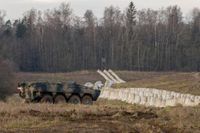As tensions between NATO and Russia continue to escalate, Poland and the Baltic states find themselves at the forefront of potential conflict, according to recent statements from Russian officials. Sergey Naryshkin, Director of Russia's Foreign Intelligence Service (SVR), warned on April 15, 2025, that these nations would be the "first to suffer" should hostilities break out between NATO and the Russian Federation.
The comments come amid heightened military posturing and aggressive rhetoric from Moscow, particularly since the beginning of Russia's full-scale invasion of Ukraine in February 2022. Naryshkin, speaking to the Russian state news outlet TASS, emphasized that while any NATO aggression would impact the entire alliance, Poland and the Baltic countries would bear the brunt of the consequences. He stated, "They should understand, but do not yet understand, that in the event of aggression by the North Atlantic Alliance against Russia and Belarus, damage will be done, of course, to the entire NATO bloc, but to a greater extent, the first to suffer will be the bearers of such ideas among the political circles of Poland and the Baltic countries."
Naryshkin's remarks reflect a broader narrative pushed by the Kremlin, which blames NATO for the current crisis in Ukraine. He accused Poland and the Baltic states of demonstrating "high aggressiveness" toward Russia, particularly citing Poland's plans to install anti-personnel mines along its borders with Belarus and the heavily militarized Kaliningrad exclave. Furthermore, he criticized Warsaw's request for the U.S. to deploy nuclear weapons in Poland.
In a significant shift, Estonia, Latvia, Lithuania, and Poland announced on March 18, 2025, their withdrawal from the Ottawa Convention, an international treaty that bans the use, production, and stockpiling of anti-personnel mines. The defense ministers of these nations cited a "fundamentally deteriorated" security situation in the region as justification for their decision. They noted that military threats from Russia and Belarus had "significantly increased," prompting this drastic measure.
Meanwhile, Ukrainian President Volodymyr Zelensky warned on April 13, 2025, that if Russia is not halted in Ukraine, it may attempt to seize NATO territory, potentially triggering a global conflict. Zelensky’s comments underscore the urgency of the situation, as Western leaders and intelligence agencies have raised alarms about a possible large-scale war in Europe within the next five years due to Russia's aggressive actions.
Amidst these developments, reports have surfaced regarding the U.S. government’s plans to withdraw approximately 10,000 troops from Eastern European member states. This potential reduction in military presence could further embolden Russia and heighten the risks faced by NATO's eastern flank.
As the geopolitical landscape becomes increasingly fraught, the implications for Poland and the Baltic states are profound. The historical context of these nations, which have long been wary of Russian intentions, adds weight to their current military and political strategies. Poland, in particular, has been vocal about its security concerns, advocating for a stronger NATO presence in the region.
In light of the ongoing conflict in Ukraine and the shifting dynamics within NATO, the need for a unified response from member states has never been more critical. Poland and the Baltic countries are calling for enhanced cooperation and support from their allies, emphasizing that their security is intrinsically linked to the overall stability of the NATO alliance.
As tensions escalate, it remains to be seen how NATO will respond to the challenges posed by Russia. The stakes are high, and the potential for conflict looms large, making the situation in Eastern Europe a focal point for international security discussions.





